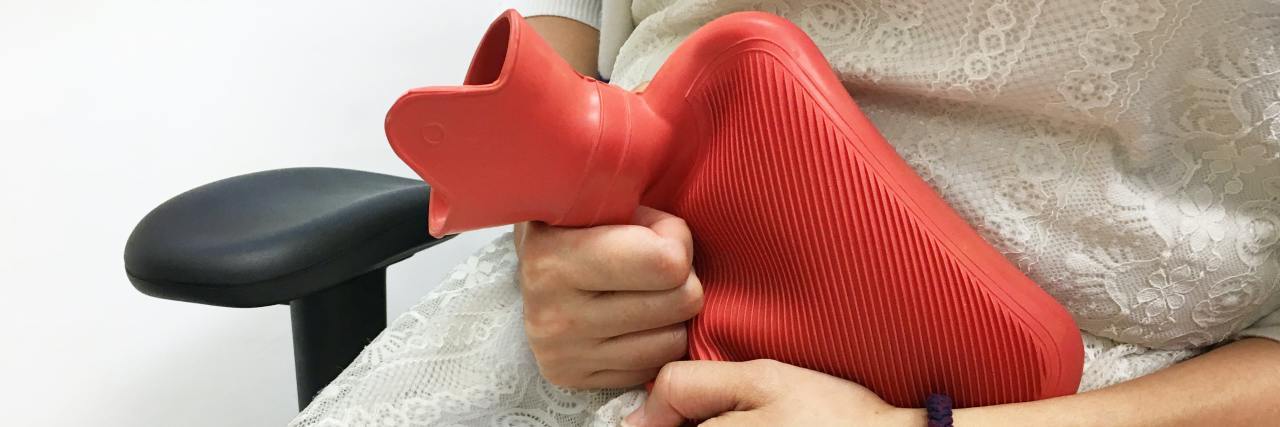The One, Crucial Thing Sexual Abuse and Endometriosis Have In Common
Editor's Note
If you’ve experienced sexual abuse or assault, the following post could be potentially triggering. You can contact The National Sexual Assault Telephone Hotline at 1-800-656-4673.
As a sexual abuse survivor, I have spent a lot of time researching the link between trauma, in particular sexual trauma, and chronic illness. Numerous researchers, like Bessel Van Der Kolk in his seminal work “The Body Keeps The Score” and Gabor Mate in books like “When the Body Says No: The Cost of Hidden Stress,” have outlined the ways in which trauma actually changes the body fundamentally at a biological level, making survivors susceptible to a myriad of diseases that are linked to increased stress. I have often wondered if my struggle with endometriosis is in fact a way that my sexual trauma manifested within my body. I obviously have no way of proving it as direct cause and effect, but they are inextricably linked in terms of the mental health toll they have had on me.
Sexual abuse and endometriosis have one crucial thing in common: lack of consent. I didn’t agree to either of them and yet, they have both hijacked my autonomy over my body in irreversible ways. They both stole my ability to experience my sexuality in a healthy way; they both caused me tremendous physical pain in my reproductive organs; and, they both violated my trust in myself. My body is a battlefield, subject to being attacked by enemies from without and within, neither of whom care about what I want or how I feel, rendering me helpless to protect myself from being harmed.
It’s hard to articulate to someone who hasn’t experienced either of these the shame that comes along with both of them. There’s a sense of feeling that there’s something inherently broken inside of you that has caused you to be susceptible to both abuse and endometriosis. Survivors of both often question, “What did I do to deserve this?” and “Why does this keep happening to me?” For a very long time, I had a distinct sense that I somehow had “bad karma,” that I must have done something wrong in life and now I’m being punished for it. It sounds irrational, but it was my way of trying to make sense out of things that seemed senseless and over which I had no control.
In my particular case, both my abuse and the treatment of — or lack thereof — my endometriosis involved the abuse of the power of men over my female body. In the case of my sexual abuse, my step-grandfather took it upon himself to use me as some kind of plaything for his own sick form of sexual gratification. In the case of my endometriosis, male doctors took it upon themselves to decide when or if I could get a hysterectomy that I very much wanted and needed but was being denied because they insisted that I would and should procreate. I harbor tremendous rage toward these men for exploiting their status as a means of repressing me and in fact of demeaning me in the most egregious ways.
And finally, I cannot state how horrendous it is to have to endure endless pelvic exams after you’ve been sexually abused. Every time I had to go for a pelvic exam, I felt retraumatized. Not only are these exams physically painful, but they are humiliating. Having a male doctor lay you on a table, naked from the waist down, hidden behind a sheet so you can’t see what’s happening, stick a cold probe into your vagina while making idiotic small talk is discomforting under “normal” circumstances… meaning without an abuse history. With an abuse history, it is panic-inducing. It wasn’t until I found a female gynecologist who was trauma-informed that I had a remotely tolerable pelvic exam. She continuously asked if it was OK for her to proceed at each step of the exam, and was telling me in detail what she was doing while her assistant held my hand to help me stay grounded. Even then, it wasn’t pleasant, but at least I didn’t feel like I was just an object… I was a human being.
Endometriosis in and of itself is a debilitating, traumatizing condition. When it is paired with a history of sexual abuse, the trauma is amplified and compounded. I don’t say this to minimize anyone’s experience, just to give voice to my unique perspective of having gone through this with the pre-existing condition of childhood sexual abuse. Based upon the statistics of the pervasiveness of sexual violence amongst girls and women, I’m certain I’m not alone in having endured this double whammy of trauma.
Photo by Kenny Wong on Unsplash

